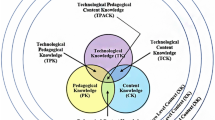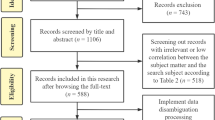Abstract
The TPACK (technological pedagogical and content knowledge) framework is an influential theoretical foundation for teaching with technology research. This analysis of 1,608 empirical research studies of TPACK identifies trends and research topics from 2000 to 2020 using structural topic modelling and bibliometrics. The results showed that academic interest in TPACK increased over the study period. The main research topics included the development and evaluation of the TPACK framework, teachers’ development of technological pedagogical content knowledge in teacher training programmes, applications of TPACK in teaching a variety of subjects (math and science, information and communication technologies, foreign languages, programming, leadership, computational thinking, engineering, medical subjects, and geography), digital literacy, online community, and motivation and belief. The results contribute to the understanding of TPACK scholarship and could help researchers and practitioners decide on practices and research directions to follow.

Source: http://tpack.org/






Similar content being viewed by others
Explore related subjects
Discover the latest articles, news and stories from top researchers in related subjects.References
Angeli, C., & Valanides, N. (2005). Preservice elementary teachers as information and communication technology designers: An instructional systems design model based on an expanded view of pedagogical content knowledge: ICT-related PCK: a model for teacher preparation. Journal of Computer Assisted Learning, 21(4), 292–302. https://doi.org/10.1111/j.1365-2729.2005.00135.x
Angeli, C., & Valanides, N. (2009). Epistemological and methodological issues for the conceptualization, development, and assessment of ICT–TPCK: Advances in technological pedagogical content knowledge (TPCK). Computers & Education, 52(1), 154–168. https://doi.org/10.1016/j.compedu.2008.07.006
Archambault, L. M., & Barnett, J. H. (2010). Revisiting technological pedagogical content knowledge: Exploring the TPACK framework. Computers & Education, 55(4), 1656–1662. https://doi.org/10.1016/j.compedu.2010.07.009
Borko, H., Whitcomb, J., & Liston, D. (2008). Wicked problems and other thoughts on issues of technology and teacher learning. Journal of Teacher Education, 60(1), 3–7. doi:https://doi.org/10.1177/0022487108328488
Chai, C. S., Koh, J. H. L., & Tsai, C. C. (2010). Facilitating Preservice Teachers’ Development of Technological, Pedagogical, and Content Knowledge (TPACK). Educational Technology & Society, 13(4), 63–73
Chai, C. S., Koh, L., Tsai, J. H., C.-C., Lee, W., & Tan, L. (2011). Modeling primary school preservice teachers’ Technological Pedagogical Content Knowledge (TPACK) for meaningful learning with information and communication technology (ICT). Computers & Education, 57(1), 1184–1193. https://doi.org/10.1016/j.compedu.2011.01.007
Chen, X., Zou, D., Xie, H. & Cheng, G. (2021). Twenty years of personalized language learning: topic modeling and knowledge mapping. Journal of Educational Technology & Society, 24(1), 205–222.
Chen, X., Yu, G., Cheng, G., & Hao, T. (2019). Research topics, author profiles, and collaboration networks in the top-ranked journal on educational technology over the past 40 years: A bibliometric analysis. Journal of Computers in Education, 6(4), 563–585. https://doi.org/10.1007/s40692-019-00149-1
Chen, X., Zou, D., Cheng, G., & Xie, H. (2020). Detecting latent topics and trends in educational technologies over four decades using structural topic modeling: A retrospective of all volumes of Computers & Education. Computers & Education, 151, 103855. https://doi.org/10.1016/j.compedu.2020.103855
Chen, X., Zou, D., Xie, H., Cheng, G., & Liu, C. (2022). Two Decades of Artificial Intelligence in Education: Contributors, Collaborations, Research Topics, Challenges, and Future Directions. Educational Technology & Society, 25(1), 28–47
Doğru, M., Çelik, M., & Satar, C. (2020). Bibliometric profile of scientific studies on pedagogocal content knowledge. Socialinis Ugdymas, 51(1), 6–23. https://doi.org/10.15823/su.2019.51.1
Ersoy, M., Kabakçı Yurdakul, I., & Ceylan, B. (2016). Investigating Preservice Teachers’ TPACK Competencies Through the Lenses of ICT Skills: An Experimental Study. TED EĞİTİM VE BİLİM. https://doi.org/10.15390/EB.2016.6345
Fu, Q. K., Zou, D., Xie, H., & Cheng, G. (2022). A review of AWE feedback: types, learning outcomes, and implications. Computer Assisted Language Learning, 1–43. https://doi.org/10.1080/09588221.2022.2033787
Falagas, M. E., Kouranos, V. D., Arencibia-Jorge, R., & Karageorgopoulos, D. E. (2008). Comparison of SCImago journal rank indicator with journal impact factor. The FASEB Journal, 22(8), 2623–2628. https://doi.org/10.1096/fj.08-107938
González-Pereira, B., Guerrero-Bote, V. P., & Moya-Anegón, F. (2010). A new approach to the metric of journals’ scientific prestige: The SJR indicator. Journal of Informetrics, 4(3), 379–391. https://doi.org/10.1016/j.joi.2010.03.002
Graham, C. R. (2011). Theoretical considerations for understanding technological pedagogical content knowledge (TPACK). Computers & Education, 57(3), 1953–1960
Guzey, S. S., & Roehrig, G. H. (2009). Teaching Science with Technology: Case Studies of Science Teachers’ Development of Technology, Pedagogy, and Content Knowledge. Contemporary Issues in Technology and Teacher Education, 9(1), 25–45
Harris, J. B., & Hofer, M. J. (2011). Technological pedagogical content knowledge (TPACK) in action: A descriptive study of secondary teachers’ curriculum-based, technology-related instructional planning. Journal of Research on Technology in Education, 43(3), 211–229
Hsu, L. (2016). Examining EFL teachers’ technological pedagogical content knowledge and the adoption of mobile-assisted language learning: A partial least square approach. Computer Assisted Language Learning, 29(8), 1287–1297. https://doi.org/10.1080/09588221.2016.1278024
Huang, X., Zou, D., Cheng, G., Chen, X., & Xie, H. (2021). Trends, research issues and applications of artificial intelligence in language education. Educational Technology & Society, 24(3), 238–255.
Jeyaraj, A., & Zadeh, A. H. (2020). Evolution of information systems research: Insights from topic modeling. Information & Management, 57(4), 103207
Jimoyiannis, A. (2010). Designing and implementing an integrated technological pedagogical science knowledge framework for science teachers professional development. Computers & Education, 55(3), 1259–1269. https://doi.org/10.1016/j.compedu.2010.05.022
Kafyulilo, A., Fisser, P., Pieters, J., & Voogt, J. (2015). ICT Use in Science and Mathematics Teacher Education in Tanzania: Developing Technological Pedagogical Content Knowledge. Australasian Journal of Educational Technology, 31(4), 381–399 https://doi.org/10.14742/ajet.1240
Kaleli Yılmaz, G. (2015a). Analysis of Technological Pedagogical Content Knowledge Studies in Turkey: A Meta-Synthesis Study. TED EĞİTİM VE BİLİM, 40(178), 103–122 https://doi.org/10.15390/EB.2015.4087
Koehler, M., & Mishra, P. (2009). What is technological pedagogical content knowledge (TPACK)? Contemporary issues in technology and teacher education, 9(1), 60–70
Koehler, M. J., Mishra, P., & Yahya, K. (2007). Tracing the development of teacher knowledge in a design seminar: Integrating content, pedagogy and technology. Computers & Education, 49(3), 740–762. https://doi.org/10.1016/j.compedu.2005.11.012
Koh, J. H. L., Chai, C. S., & Lim, W. Y. (2017). Teacher Professional Development for TPACK-21CL: Effects on Teacher ICT Integration and Student Outcomes. Journal of Educational Computing Research, 55(2), 172–196. https://doi.org/10.1177/0735633116656848
Koh, J. H. L., Chai, C. S., & Tsai, C. C. (2010). Examining the technological pedagogical content knowledge of Singapore preservice teachers with a large-scale survey: Singapore preservice teachers’ TPACK perceptions. Journal of Computer Assisted Learning, 26(6), 563–573. https://doi.org/10.1111/j.1365-2729.2010.00372.x
Küsters, A., & Garrido, E. (2020). Mining PIGS. A structural topic model analysis of Southern Europe based on the German newspaper Die Zeit (1946–2009). Journal of Contemporary European Studies, 28(4), 477–493
Lee, E., Brown, M. N., Luft, J. A., & Roehrig, G. H. (2007). Assessing beginning secondary science teachersʼ PCK: pilot year results. School Science and Mathematics, 107(2), 52–60. doi:https://doi.org/10.1111/j.1949-8594.2007.tb17768.x
Lin, T. C., Tsai, C. C., Chai, C. S., & Lee, M. H. (2013). Identifying Science Teachers’ Perceptions of Technological Pedagogical and Content Knowledge (TPACK). Journal of Science Education and Technology, 22(3), 325–336. https://doi.org/10.1007/s10956-012-9396-6
Liu, C., Zou, D., Chen, X., Xie, H., & Chan, W. H. (2021). A bibliometric review on latent topics and trends of the empirical MOOC literature (2008–2019).Asia Pacific Education Review,1–20
Lucas, C., Nielsen, R. A., Roberts, M. E., Stewart, B. M., Storer, A., & Tingley, D. (2015). Computer-Assisted Text Analysis for Comparative Politics. Political Analysis, 23(2), 254–277. https://doi.org/10.1093/pan/mpu019
Merigó, J. M., Cobo, M. J., Laengle, S., Rivas, D., & Herrera-Viedma, E. (2019). Twenty years of Soft Computing: A bibliometric overview. Soft Computing, 23(5), 1477–1497. https://doi.org/10.1007/s00500-018-3168-z
Mimno, D., Wallach, H., Talley, E., Leenders, M., & McCallum, A. (2011). Optimizing Semantic Coherence in Topic Models. Proceedings of the 2011 Conference on Emprical Methods in Natural Language Processing, 262–272
Mishra, P., & Koehler, M. J. (2006). Technological Pedagogical Content Knowledge: A Framework for Teacher Knowledge. Teachers College Record, 108(6), 1017–1054. https://doi.org/10.1111/j.1467-9620.2006.00684.x
Mishra, P., Koehler, M. J., & Henriksen, D. (2011). The seven trans-disciplinary habits of mind: Extending the TPACK framework towards 21st century learning.Educational Technology,22–28
Miyata, Y., Ishita, E., Yang, F., Yamamoto, M., Iwase, A., & Kurata, K. (2020). Knowledge structure transition in library and information science: topic modeling and visualization. Scientometrics, 125(1), 665–687
Niess, M. L. (2005). Preparing teachers to teach science and mathematics with technology: Developing a technology pedagogical content knowledge. Teaching and Teacher Education, 21(5), 509–523. https://doi.org/10.1016/j.tate.2005.03.006
Niess, M. L. (2011). Investigating TPACK: Knowledge Growth in Teaching with Technology. Journal of Educational Computing Research, 44(3), 299–317. https://doi.org/10.2190/EC.44.3.c
Pierson, M. E. (2001). Technology Integration Practice as a Function of Pedagogical Expertise. Journal of Research on Computing in Education, 33(4), 413–430. https://doi.org/10.1080/08886504.2001.10782325
Roberts, M. E., Stewart, B. M., Tingley, D., Lucas, C., Leder-Luis, J., Gadarian, S. K. … Rand, D. G. (2014). Structural Topic Models for Open-Ended Survey Responses: STRUCTURAL TOPIC MODELS FOR SURVEY RESPONSES. American Journal of Political Science, 58(4), 1064–1082. https://doi.org/10.1111/ajps.12103
Rosenberg, J. M., & Koehler, M. J. (2015). Context and technological pedagogical content knowledge (TPACK): A systematic review. Journal of Research on Technology in Education, 47(3), 186–210. https://doi.org/10.1080/15391523.2015.1052663
Schmidt, D. A., Baran, E., Thompson, A. D., Mishra, P., Koehler, M. J., & Shin, T. S. (2009). Technological Pedagogical Content Knowledge (TPACK): The Development and Validation of an Assessment Instrument for Preservice Teachers. Journal of Research on Technology in Education, 42(2), 123–149. https://doi.org/10.1080/15391523.2009.10782544
Setiawan, H., Phillipson, S., Sudarmin, & Isnaeni, W. (2019). Current trends in TPACK research in science education: A systematic review of literature from 2011 to 2017. Journal of Physics: Conference Series, 1317, 012213. https://doi.org/10.1088/1742-6596/1317/1/012213
Su, F., & Zou, D. (2020). Technology-enhanced collaborative language learning: theoretical foundations, technologies, and implications. Computer Assisted Language Learning, 1–35, https://doi.org/10.1080/09588221.2020.1831545
Shulman, L. (1987). Knowledge and Teaching:Foundations of the New Reform. Harvard Educational Review, 57(1), 1–23. https://doi.org/10.17763/haer.57.1.j463w79r56455411
Shulman, L. S. (1986). Those Who Understand: Knowledge Growth in Teaching. Educational Researcher, 15(2), 4–14. https://doi.org/10.3102/0013189X015002004
So, H. J., & Kim, B. (2009). Learning about problem based learning: Student teachers integrating technology, pedagogy and content knowledge. Australasian Journal of Educational Technology, 25(1), 101–116 https://doi.org/10.14742/ajet.1183
Soler-Costa, R., Moreno-Guerrero, A. J., López-Belmonte, J., & Marín-Marín, J. A. (2021a). Co-Word Analysis and Academic Performance of the Term TPACK in Web of Science. Sustainability, 13(3), 1481. https://doi.org/10.3390/su13031481
Song, Y., Chen, X., Hao, T., Liu, Z., & Lan, Z. (2019). Exploring two decades of research on classroom dialogue by using bibliometric analysis. Computers & Education, 137, 12–31. https://doi.org/10.1016/j.compedu.2019.04.002
Voogt, J., Fisser, P., Pareja Roblin, N., Tondeur, J., & van Braak, J. (2013). Technological pedagogical content knowledge - a review of the literature: Technological pedagogical content. Journal of Computer Assisted Learning, 29(2), 109–121. https://doi.org/10.1111/j.1365-2729.2012.00487.x
Whetten, D. A. (1989). What constitutes a theoretical contribution? The Academy of Management Review, 14(4), 490–495. doi:https://doi.org/10.2307/258554
Willermark, S. (2018). Technological Pedagogical and Content Knowledge: A Review of Empirical Studies Published From 2011 to 2016. Journal of Educational Computing Research, 56(3), 315–343. https://doi.org/10.1177/0735633117713114
Wright, T., & Pullen, S. (2007). Examining the literature: A bibliometric study of ESD journal articles in the Education Resources Information Center Database. Journal of Education for Sustainable Development, 1(1), 77–90
Wu, Y. T. (2013). Research trends in technological pedagogical content knowledge (TPACK) research: A review of empirical studies published in selected journals from 2002 to 2011: Colloquium. British Journal of Educational Technology, 44(3), E73–E76. https://doi.org/10.1111/j.1467-8535.2012.01349.x
Yalçın, H., & Yayla, K. (2016). Scientometric Analysis of the Researches About Technological Pedagogical Content Knowledge and Scholarly Communication. Education & Science/Egitim ve Bilim, 41(188), 291–307
Yurdakul, I. K., & Coklar, A. N. (2014). Modeling preservice teachers’ TPACK competencies based on ICT usage. 14
Yurdakul, K. I., Odabasi, H. F., Kilicer, K., Coklar, A. N., Birinci, G., & Kurt, A. A. (2012). The development, validity and reliability of TPACK-deep: A technological pedagogical content knowledge scale. Computers & Education, 58(3), 964–977. https://doi.org/10.1016/j.compedu.2011.10.012
Zhang, R., & Zou, D. (2020). Types, purposes, and effectiveness of state-of-the-art technologies for second and foreign language learning. Computer Assisted Language Learning, 1–47. https://doi.org/10.1080/09588221.2020.1744666
Zou, D., Huang, Y., & Xie, H. (2021). Digital game-based vocabulary learning: where are we and where are we going?. Computer Assisted Language Learning, 34(5-6), 751–777.
Author information
Authors and Affiliations
Corresponding author
Ethics declarations
Conflict of Interest
None
Additional information
Publisher’s Note
Springer Nature remains neutral with regard to jurisdictional claims in published maps and institutional affiliations.
Rights and permissions
About this article
Cite this article
Zou, D., Huang, X., Kohnke, L. et al. A bibliometric analysis of the trends and research topics of empirical research on TPACK. Educ Inf Technol 27, 10585–10609 (2022). https://doi.org/10.1007/s10639-022-10991-z
Received:
Accepted:
Published:
Issue Date:
DOI: https://doi.org/10.1007/s10639-022-10991-z




